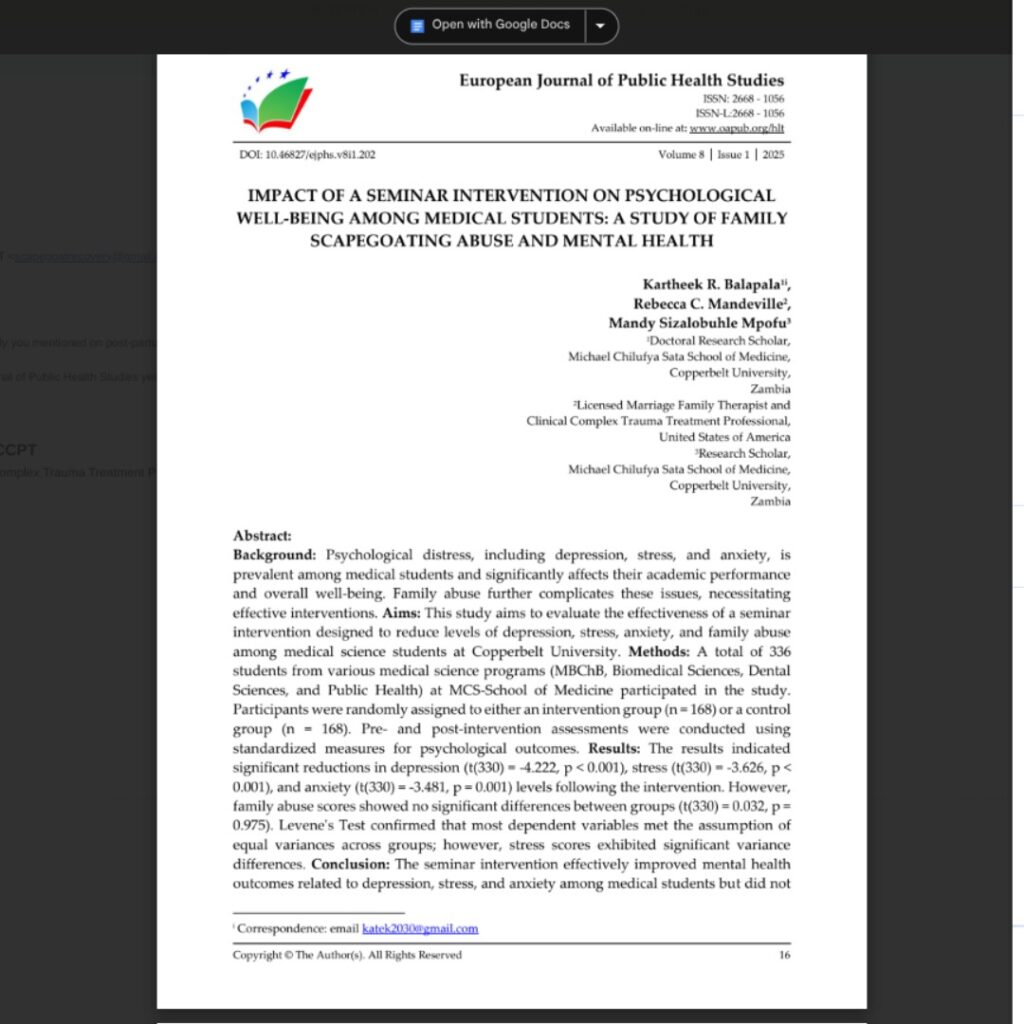How the recognition of FSA in academic and clinical settings can benefit adult survivors

Update – March 2025: The first quantitative research study on Family Scapegoating Abuse (FSA) has been published in the peer-reviewed journal, European Journal of Public Health Studies. You can read the study in full here: https://oapub.org/hlt/index.php/EJPHS/article/view/202/202
I wanted subscribers of my FSA Education Substack to be the first to know that the first peer-reviewed quantitative research study on Family Scapegoating Abuse (FSA) will soon be published – I will be credited as co-author / affiliate on this publication as the study was based on my original research tools that I developed when conducting qualitative studies over the past 15-plus years on the unique dysfunctional family systems phenomenon I identified and named ‘Family Scapegoating Abuse’ (FSA).
This FSA study conducted by my co-author, Doctoral Research Fellow (and Scholar) Dr Balapala Kartheek (MD/Psych), is a research project on medical students in the copperbelt University of Zambia and will be published by 2025.
Why Peer-Reviewed Quantitative Research on FSA Matters
The growing recognition of Family Scapegoating Abuse (FSA) in academic and clinical settings is crucial for several reasons, as it sheds light on a pervasive yet often overlooked form of family dysfunction and emotional harm.
Scapegoating, where one family member is unfairly blamed for all the family’s problems or dysfunctions, can lead to profound mental health issues for the targeted individual. The recognition of FSA in academic research and clinical settings is essential because it brings awareness to these dynamics, enabling more accurate diagnoses and targeted interventions for those affected. With greater acknowledgment and understanding of FSA, individuals who experience scapegoating can receive the support they need to heal from the various traumas (e.g., complex trauma; betrayal trauma; traumatic invalidation) associated with this form of ‘invisible’ abuse (as confirmed by my original Family Systems research).
Historically, the psychological and emotional abuse (and attendant damage) associated with being in the ‘scapegoat’ role in one’s family-of-origin has been woefully underrepresented in academic research and clinical practice, with many professionals failing to identify the long-term and far-reaching consequences of individual and systemic scapegoating on child victims and adult children survivors.
This is a primary reason why I have spent over 15 years identifying features and phenomena associated with Family Scapegoating Abuse in addition to conducting qualitative studies assessing its impact on child victims and adult survivors. It is this research that supported assertions made in my introductory book on FSA, Rejected, Shamed, and Blamed: Help and Hope for Adults in the Family Scapegoat Role.
The publication of peer-reviewed, quantitative research on FSA is pivotal in moving the conversation forward. Quantitative studies help validate the experiences of those affected by scapegoating, providing empirical evidence that supports the validity of their emotional and psychological struggles. This body of research – in addition to the years of qualitative research on FSA I’ve conducted – enhances the credibility of FSA as a distinct form of abuse and lays the groundwork for evidence-based interventions.
FSA Child Victims and Adult Survivors: A Neglected Population
Prior to my original research on FSA, there was a lack of objective data to demonstrate the long-term effects of being scapegoated within one’s family-of-origin, which meant that individuals suffering from its effects had their experiences invalidated, dismissed or misunderstood by mental health professionals.
Peer-reviewed studies give clinicians and researchers concrete data, enabling them to understand the dynamics of FSA better, leading to more informed treatment approaches and support systems for individuals impacted by it.
Furthermore, the emergence of FSA in academic and clinical circles helps foster a more comprehensive understanding of family systems and psycho-emotional abuse. It challenges traditional views of family roles, particularly those that may be rooted in outdated or unexamined notions of authority and familial hierarchy.
Understanding FSA and its systemic impact via qualitative and quantitative research studies also benefits clinicians treating affected families as well. By recognizing the reality of scapegoating abuse in families, it becomes easier to identify harmful family structures that perpetuate psycho-emotional abuse so as to promote robust models of treatment and support for affected individuals and families.
In turn, this recognition can influence societal attitudes towards this litte-understood form of abuse, expanding the scope of what is considered harmful and requiring intervention and/or self-protection (such as limiting or ending contact with abusive family members). This broader understanding is essential for preventing further emotional trauma and supporting FSA adult survivors in healing from these deeply ingrained dysfunctions.
In sum, the recognition of FSA in academic and clinical settings, supported by both qualitative and peer-reviewed quantitative research, is vital for both individuals and families affected by this form of abuse and the broader field of mental health care and clinician education as a whole. Such research enables more accurate diagnosis, targeted interventions, and the development of healthier familial and societal structures that promote emotional well-being and recovery.
